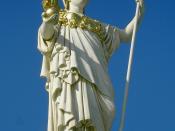The Goddess Athena has been an incredibly well-liked mythological character for centuries because of her complex personality and the values which are taught through her actions. The powerful Goddess has been generally thought of as being the same person in both Greek and Roman stories alike, but this is not true. Athena was looked upon and spoken of very differently in Roman and Greek myths, though she remains with the same basic personality traits in both cultures.
Rome acquired it's stories of mythology and religion from the Italians (who
derived their beliefs from the Greeks), and therefore most of the myths of deities were the same as the Greeks', but with a few changes. The Italians also gave the Romans stories of Diana, Hercules, Venus, and a few minor characters. The Greeks came about with their Gods from past ancient cultures, weaving in some of their own characteristics as time went on.
Pallas Athena (the name Pallas being that of her best friend, whom she accidentally killed while practicing with spears) in both cultures is the patron Goddess of arts and crafts, weaving, the olive tree, overseer of Athens, and especially of Wisdom/War. Because the Greek culture was one of intelligence, sophistication and knowledge, Their version of Athena was mainly of a logical and sensible person, who would avoid a fight if possible. The Romans, who were a society of warlike men, focused on Minerva's war capabilities and short temper. Both cultures focused on the parts of the Gods which were most like themselves and best suited their needs.
For the Greeks, the Gray-Eyed Goddess was not associated with specific people except for Her rivals. The Romans, however, formed a group of Immortals into the Capitoline triad, consisting of Jupiter, Juno and Minerva. These three assumed...


